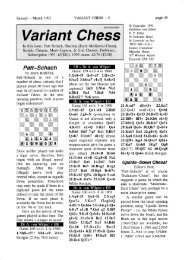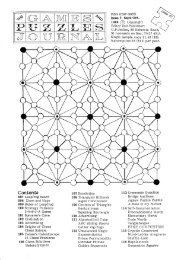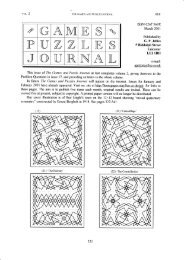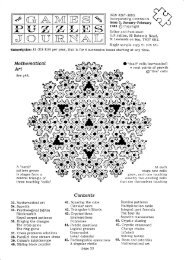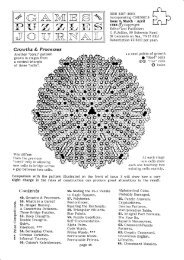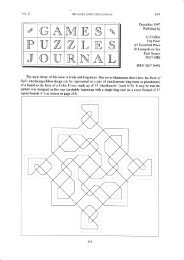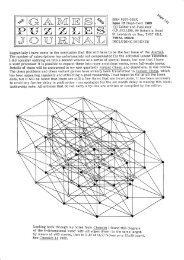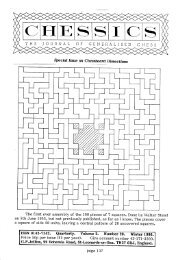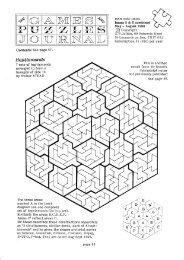The Games and Puzzles Journal, #8+9 - Mayhematics
The Games and Puzzles Journal, #8+9 - Mayhematics
The Games and Puzzles Journal, #8+9 - Mayhematics
Create successful ePaper yourself
Turn your PDF publications into a flip-book with our unique Google optimized e-Paper software.
page 120 THE GAMES AND PUZZLES JOURNAL issue 8+9<br />
CAP"D PLAY<br />
Soccer cs c Card Game<br />
By Alan PARR<br />
Hopscotch, 6 Longfield Gardens, Tring, Herts, HP23 4DN<br />
Just about ten years ago it occugred to me that there is no well known card game<br />
based upon soccer. It wouldn't have been difficult to come up with a fairly conventional<br />
game in which the taking of tricks represented the winning of .tackles <strong>and</strong> consequent<br />
moving the ball upfield, but I wanted something which would be much more faithful<br />
to the spirit of the sport. A two-stage game, in which the two players would take the<br />
part of club managers, felt about right to me. In the first phase the managers would<br />
select their players <strong>and</strong> the tactics they would use, while in the second stage the match<br />
would be played out <strong>and</strong> the result determined. Naturally managers would be constrained<br />
by limited resources <strong>and</strong> so would be forced to decide how to make the best use of them<br />
- should they play an all-out attacking game <strong>and</strong> leave themselves with possible<br />
weaknesses in defence, or should they concentrate on not conceding any goals <strong>and</strong> hope<br />
they could sneali a winner? Perhaps packing midfield would give them general control<br />
with chances to score on the break? Of course, finding a mechanism which would do<br />
all this <strong>and</strong> still be simple enough to be playable might not be too easy, but that didntt<br />
seem to be any reason not to trY.<br />
In fact, the method I came up with is one of those things that after the event<br />
seems so obvious that you canrt.imagine why it hasn't been invented a dozen times over.<br />
For simplicity, I discarded the court cards from the pack <strong>and</strong> so was left with forty<br />
cardsr'four each of value one(Ace) to ten. Each manager is given eleven cards to represent<br />
the players in his team; the values of the cards are the skill levels of the players, so<br />
that the most valuable players are the 10s <strong>and</strong> the ls <strong>and</strong> 2s are pretty useless (for a<br />
fair comparison of managerial skill in a Cup Final the two managers should be given<br />
identical collections of players, but in a run-of-the-mill League game they might not<br />
bother, relying on luck evening out over a number of games).<br />
<strong>The</strong> managers arrange their.players into team formation, putting the cards face<br />
down until both are happy with their formations, when the teams are turned face up.<br />
A team must have a goalkeeper, at least two defenders, at least two midfielders, <strong>and</strong><br />
at least two forwards; it is up to the manager to decide on both the formation he wishes<br />
to use, <strong>and</strong> which players will operate in which positions. Complementary areas are<br />
then compared, so that a team whose forward line has an overall higher rating than<br />
its opponentts defenders will receive an appropriate number of shots, <strong>and</strong> the team with<br />
the stronger midfield will consequently receive a few shots (thougn proportionately<br />
not so many). To evaluate the shots, cards from the undealt portion of the pack are<br />
turned up <strong>and</strong> compared to the strength of the goalkeeper, scoring if the goalkeeper<br />
is not good enough to stop them.<br />
This relatively simple mechanism has proved immensely robust; all sorts of extra<br />
chrome has been piled on top of it so that accommodation can be made for teams playing<br />
hard, advantages given to the team playini at home, <strong>and</strong> also methods provided for<br />
the away side playing ultradefensively <strong>and</strong> prepared to settle for a draw, <strong>and</strong> for different<br />
tactical styles such as using a sweeper or the offside trap. AII these developments have<br />
resulted from the medium of playing the game by post, as outlined in my previous article<br />
(caP.{49., pp72-3).<br />
United has become an absorbing hobby for myself <strong>and</strong> hundreds of others, so in<br />
theselJffies I have only been able to scratch the surface of the game. Details of the<br />
basic card game, <strong>and</strong> seven other card games on sporting themes can be found in<br />
Tournament, obtainable from myself at the address given above, for the cost of €1 <strong>and</strong><br />
a stamped self-addressed envelope (A5 size). I can also supply a comprehensive guide<br />
to United in postal form in a booklet costing t2.50 (plus A5 SSAE). If you'd simply like<br />
to know a little about the postal games hobby - which offers not Just United but almost<br />
every game under the sun - then send a large self-addressed envelope <strong>and</strong> a few stamps<br />
<strong>and</strong> Irll put in some sample tzines' as well. My own zine, Hopscotch runs R 60-tanm United<br />
league <strong>and</strong> many other games besides. It appears every 6 weeks <strong>and</strong> costs 40p plus postage<br />
If you play in United there is a game fee of 81.50 to eover the whole season



